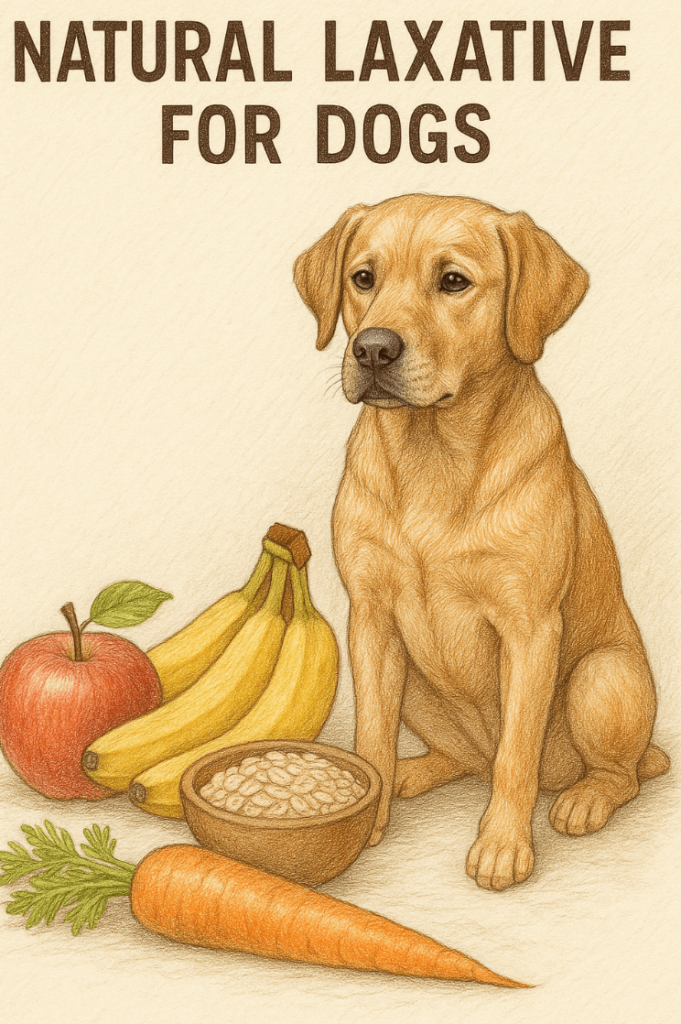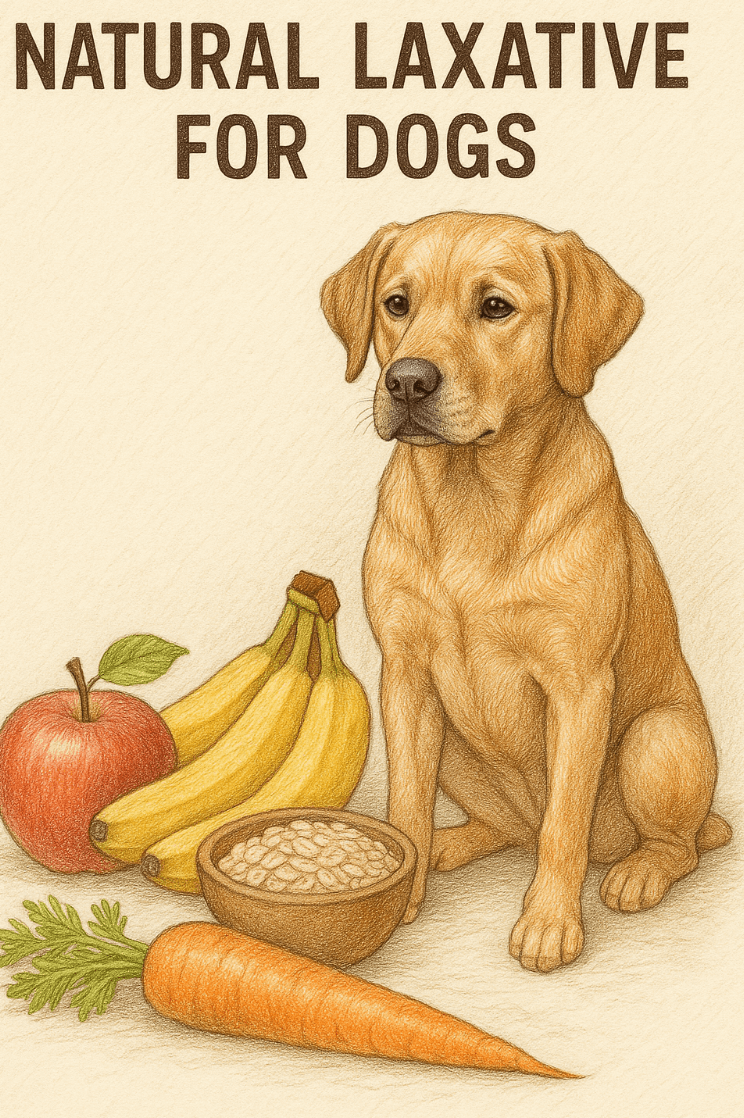Natural Laxative for Dogs: Gentle Solutions for Digestive Health
Just like humans, dogs can occasionally experience digestive issues such as constipation. While this is rarely a cause for alarm, it’s important to address it promptly to ensure your furry friend stays comfortable and healthy. Natural laxatives for dogs offer a safe and gentle way to help them relieve constipation without resorting to harsh medications. From dietary adjustments to herbal remedies, there are plenty of options to explore. In this blog post, we’ll delve into the best natural laxatives for dogs, how they work, and tips for maintaining your dog’s digestive health. Whether you’re dealing with an occasional issue or looking to prevent future problems, these solutions will keep your pup happy and regular.
Best Natural Laxatives for Dogs
When it comes to easing your dog’s constipation, natural remedies can be highly effective. Here are some tried-and-true options that are safe and easy to incorporate into your dog’s routine.
Pumpkin Puree:
Rich in fiber and moisture, plain canned pumpkin (not pumpkin pie filling) helps regulate digestion and soften stools.Canned Coconut Oil:
This natural oil acts as a mild lubricant, aiding bowel movements while providing additional health benefits like improved skin and coat.Aloe Vera Juice:
A small amount of food-grade aloe vera juice can soothe the digestive tract and promote regularity.Probiotics:
Adding probiotics to your dog’s diet supports gut health by balancing beneficial bacteria in the digestive system.Psyllium Husk Powder:
This soluble fiber absorbs water, softening stools and making them easier to pass without causing irritation.
These natural laxatives are gentle on your dog’s system and can often resolve constipation quickly. Always introduce them gradually and monitor your dog’s response.
Foods to Avoid When Treating Constipation
While certain foods can help alleviate constipation, others may worsen the problem or harm your dog’s digestive system. Here’s what to avoid when managing your dog’s condition.
Processed Foods:
High-fat, salty snacks like chips or processed meats can disrupt digestion and lead to further complications.Dairy Products:
Many dogs are lactose intolerant, and dairy can cause gas, bloating, or diarrhea instead of relieving constipation.Bones and Tough Chews:
Cooked bones or indigestible chews can cause blockages in the intestines, exacerbating constipation.High-Protein Diets Without Fiber:
Excessive protein without adequate fiber can slow down digestion, worsening constipation over time.Toxic Human Foods:
Items like chocolate, grapes, onions, and garlic are toxic to dogs and should never be used as remedies.
Avoiding these foods ensures your dog’s digestive system isn’t further stressed while you work on resolving their constipation.
Check this guide 👉Can You Give a Dog a Laxative? Best 7 Expert Tips!
Check this guide 👉My Dog Sleeps All Day: Best 7 Expert Tips!

Safe Natural Laxatives for Dogs | Foods to Avoid for Digestive Health |
|---|---|
Pumpkin puree | Processed snacks and chips |
Canned coconut oil | Dairy products like milk or cheese |
Probiotic supplements | Cooked or raw bones |
Psyllium husk powder | High-protein diets lacking fiber |
Aloe vera juice (food-grade) | Toxic human foods (chocolate, grapes) |
Signs Your Dog May Need a Natural Laxative
It’s important to recognize the signs of constipation early so you can take action before the issue becomes severe. Here are some common symptoms to watch for.
Straining During Bowel Movements:
If your dog is visibly struggling or crying while trying to poop, it could indicate constipation.Infrequent Stools:
A noticeable decrease in the frequency of bowel movements is a key indicator of potential blockage.Hard or Dry Stools:
Passing hard, dry feces suggests dehydration or insufficient fiber in their diet.Lethargy or Discomfort:
Dogs with constipation may appear less energetic or show signs of abdominal pain.Loss of Appetite:
A sudden disinterest in food can sometimes accompany digestive issues like constipation.
Addressing these signs promptly with natural remedies can prevent more serious complications down the line.
Tips for Maintaining Your Dog’s Digestive Health
Prevention is always better than cure. By incorporating these practices into your dog’s daily routine, you can reduce the likelihood of constipation and promote overall digestive wellness.
Provide Plenty of Fresh Water:
Hydration is essential for keeping stools soft and preventing dehydration-related constipation.Incorporate Fiber-Rich Foods:
Add vegetables like green beans or sweet potatoes to your dog’s meals to boost their fiber intake naturally.Stick to a Consistent Diet:
Sudden changes in diet can upset your dog’s stomach; transition foods gradually over several days.Ensure Regular Exercise:
Physical activity stimulates the digestive system and encourages regular bowel movements.Schedule Routine Vet Check-Ups:
Regular vet visits can help identify underlying conditions that might contribute to digestive issues.
By following these tips, you can support your dog’s digestive health and minimize the risk of constipation.
Common Causes of Constipation in Dogs
Understanding why your dog might be constipated can help you address the root cause and prevent future occurrences. Here are some common culprits behind this uncomfortable condition.
Dehydration:
Insufficient water intake can lead to dry, hard stools that are difficult to pass.Lack of Exercise:
Sedentary lifestyles can slow down the digestive process, contributing to constipation.Dietary Changes:
Switching foods abruptly or feeding low-fiber diets can disrupt normal bowel function.Hairballs or Foreign Objects:
Ingesting hair or non-digestible items can cause blockages in the intestines.Underlying Medical Conditions:
Issues like hypothyroidism or gastrointestinal disorders may contribute to chronic constipation.
Identifying and addressing these causes can help prevent recurring episodes of constipation.
Herbal Remedies for Dog Constipation
For pet owners interested in holistic approaches, herbal remedies can provide additional support for your dog’s digestive health. Here are some safe options to consider.
Slippery Elm Bark:
This herb soothes the digestive tract and adds bulk to stools, making them easier to pass.Ginger Root:
Known for its anti-inflammatory properties, ginger can stimulate digestion and ease discomfort.Dandelion Greens:
Rich in vitamins and minerals, dandelion greens promote liver function and improve digestion.Marshmallow Root:
This herb acts as a natural demulcent, reducing irritation in the gut and supporting bowel movements.Chamomile Tea:
A small amount of chamomile tea can calm an upset stomach and encourage relaxation.
Always consult your vet before introducing new herbs to ensure they’re safe for your dog.
How to Transition to a High-Fiber Diet Safely
If your dog frequently struggles with constipation, transitioning to a high-fiber diet can make a significant difference. However, it’s important to do this gradually to avoid upsetting their stomach.
Start Slowly:
Begin by mixing small amounts of fiber-rich foods with their current diet, increasing the proportion over a week or two.Choose Dog-Safe Ingredients:
Opt for ingredients like pumpkin, sweet potatoes, or green beans, which are both nutritious and easy to digest.Monitor Their Reaction:
Watch for any signs of gas, bloating, or diarrhea, which may indicate the change is too rapid.Balance Protein and Fiber:
Ensure your dog’s diet still contains adequate protein to meet their nutritional needs.Consult Your Vet:
If unsure about the best approach, ask your veterinarian for personalized advice tailored to your dog’s needs.
A gradual transition ensures your dog adapts comfortably to their new diet.
Frequently Asked Questions About Natural Laxatives for Dogs
How much pumpkin should I give my dog?
Start with 1-2 teaspoons for small dogs and 1-2 tablespoons for larger breeds, adjusting based on their response.
Can I use human probiotics for my dog?
It’s better to use probiotics specifically formulated for dogs, as human versions may not target the same bacterial strains.
Is coconut oil safe for all dogs?
Yes, but introduce it slowly and in moderation, starting with ¼ teaspoon per 10 pounds of body weight.
How long does it take for natural laxatives to work?
Most remedies take effect within 12-24 hours, but results vary depending on the severity of constipation.
When should I see a vet?
If your dog hasn’t had a bowel movement in 48 hours or shows signs of distress, seek veterinary care immediately.
Prioritizing Your Dog’s Digestive Health Naturally
Constipation in dogs doesn’t have to be a stressful ordeal. With the right knowledge and tools, you can use natural laxatives to gently relieve your dog’s discomfort and restore their digestive balance. From fiber-rich foods to hydration and exercise, these simple yet effective strategies ensure your pup stays happy and healthy. Remember, prevention is key—by maintaining a consistent routine and monitoring your dog’s habits, you can catch issues early and keep their digestive system running smoothly. With love, care, and a little extra attention, your dog will thrive under your thoughtful guidance.
Do Cats Have Taste Buds? Best 7 Expert Tips! – Discover how cats experience flavors and why their taste is so unique.
Do Dogs Have Taste Buds? Best 7 Expert Tips! – Discover how dogs experience taste, their preferences, and what it means for their diet and health.
Can Cats Taste Sweet? Best 7 Expert Tips! – Discover why cats can’t taste sweetness, how it affects their diet, and tips to keep them healthy and happy.
Can Dogs Taste Sweet? Best 7 Expert Tips! – Discover how dogs perceive sweetness, which foods are safe, and tips to manage their sweet cravings responsibly.





